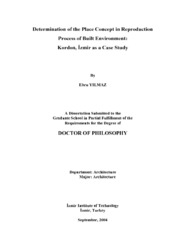Please use this identifier to cite or link to this item:
https://hdl.handle.net/11147/2919Full metadata record
| DC Field | Value | Language |
|---|---|---|
| dc.contributor.advisor | Ergül, Emre | - |
| dc.contributor.author | Yılmaz, Ebru | - |
| dc.date.accessioned | 2014-07-22T13:48:36Z | - |
| dc.date.available | 2014-07-22T13:48:36Z | - |
| dc.date.issued | 2004 | - |
| dc.identifier.uri | http://hdl.handle.net/11147/2919 | - |
| dc.description | Thesis (Doctoral)--İzmir Institute of Technology, Architecture, İzmir, 2004 | en_US |
| dc.description | Includes bibliographical references (leaves: 145) | en_US |
| dc.description | Text in English; Abstract: Turkish and English | en_US |
| dc.description | x, 189 leaves | en_US |
| dc.description.abstract | This research aims to argue the transformative effect of modernist processes on the reproduction of built environment with reference to the concepts "place" and "space" Place as lived space will be questioned under the impact of the process of the reproduction of built environment. At the same time, it is related with the general rules of the process of production. Urban space, which is basically determined with power relations, is perceived through spatial codes that conduct the effect of this relation. Space as a representation of a particular discourse and idea is more than a neutral box. Clearly, it exhibits a multi-layered structure representing all types of political, economic, social and cultural discourses behind its creation. The concept of place involves firstly the spatial relations taking place in a particular geography and secondly the sense of attachment evoked as a result of these relations. Place concept cannot be thought independent of the power whose existence dictates all these relation types. In addition to that, space that continues to be produced through the practices of daily life remains to be a part of mental production, both individually and collectively. If the production of space is taken into consideration, each manipulation is also a redefinition of all elements constructing the identity of places and sense of belonging. For that reason, in order to analyze the meaning of a place, detailed reading of all layers involving the deciphering of their historical stratification is required. Reproduction of space is an entire reproduction with all its relations taking place in it. At the same time, it is the reproduction of place with all features that identifies it. Thus, today, a new viewpoint is required; because physical restructurings form a constant threat for our cities by destroying their identical spaces and physical focuses of social life, and finally by creating a crisis of memory. | en_US |
| dc.language.iso | en | en_US |
| dc.publisher | Izmir Institute of Technology | en_US |
| dc.rights | info:eu-repo/semantics/openAccess | en_US |
| dc.subject.lcc | NA2765 .Y52 2004 | en |
| dc.subject.lcsh | Space (Architecture)--İzmir (Turkey) | en |
| dc.subject.lcsh | Space (Architecture)--Psychological aspects | en |
| dc.subject.lcsh | Public spaces | en |
| dc.subject.lcsh | Architecture--Human factors | en |
| dc.subject.lcsh | City planning--Psychological aspects | en |
| dc.title | Determination of the Place Concept in Reproduction Process of Built Environment: Kordon, Izmir as a Case Study | en_US |
| dc.type | Doctoral Thesis | en_US |
| dc.institutionauthor | Yılmaz, Ebru | - |
| dc.department | Thesis (Doctoral)--İzmir Institute of Technology, Architecture | en_US |
| dc.relation.publicationcategory | Tez | en_US |
| dc.identifier.wosquality | N/A | - |
| dc.identifier.scopusquality | N/A | - |
| item.cerifentitytype | Publications | - |
| item.languageiso639-1 | en | - |
| item.openairetype | Doctoral Thesis | - |
| item.openairecristype | http://purl.org/coar/resource_type/c_18cf | - |
| item.fulltext | With Fulltext | - |
| item.grantfulltext | open | - |
| crisitem.author.dept | 02.02. Department of Architecture | - |
| Appears in Collections: | Phd Degree / Doktora | |
Files in This Item:
| File | Description | Size | Format | |
|---|---|---|---|---|
| T000486.pdf | DoctoralThesis | 8.26 MB | Adobe PDF |  View/Open |
CORE Recommender
Page view(s)
544
checked on Apr 14, 2025
Download(s)
652
checked on Apr 14, 2025
Google ScholarTM
Check
Items in GCRIS Repository are protected by copyright, with all rights reserved, unless otherwise indicated.